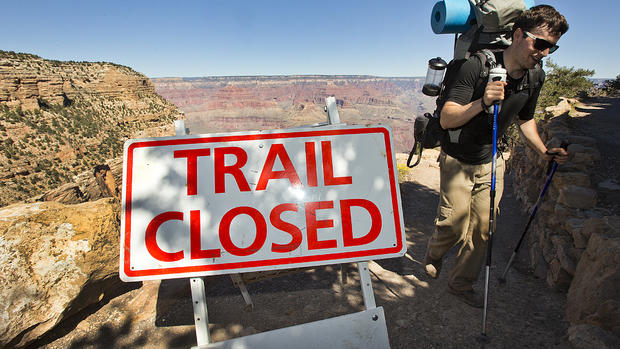Some states reopen nat'l parks amid gov't shutdown
SALT LAKE CITY The Obama administration's willingness to reopen national parks shuttered by the government shutdown came with a big caveat: States must foot the bill with money they likely won't see again.
So far, Utah, Colorado, South Dakota, Arizona and New York have jumped at the deal. Governors in other states were trying to gauge Friday what would be the bigger economic hit - paying to keep the parks operating or losing the tourist money that flows when the scenic attractions are open.
South Dakota and several corporate donors worked out a deal with the National Park Service to reopen Mount Rushmore beginning Monday. Gov. Dennis Daugaard said it will cost $15,200 a day to pay the federal government to run the landmark in the Black Hills.
He said he wired four days' worth of the donations on Friday.
In New York, Gov. Andrew Cuomo said the state will pay $61,600 a day to fully fund Park Service personnel and keep the Statue of Liberty open. Arizona officials said a deal reached Friday will mean visitors should be able to return to Grand Canyon National Park on Saturday.
In Utah, federal workers rushed to reopen five national parks for 10 days after the state sent $1.67 million to the U.S. government with the hope of saving its lucrative tourist season.
Zion National Park superintendent Jock Whitworth said staff members began opening gates and removing barriers and expected to have the park fully operational Saturday.
"This is a practical and temporary solution that will lessen the pain for some businesses and communities in Utah during this shutdown," Interior Department Secretary Sally Jewell said in a statement.
It was welcome news for beleaguered shop owners in the small town of Springdale adjacent to Zion. Hotels have been vacant and rental and retail shops have seen sales plummet during the shutdown.
"It's going to be awesome," said Jenna Milligan of Zion Outfitters, an outdoor gear rental shop. "A lot of businesses have suffered severely because of the government. I just hope it does stay open through autumn."
In Colorado, officials said a deal had been struck for the state to pay $360,000 to reopen Rocky Mountain National Park for 10 days to allow tourists to reach Estes Park. The visitors are needed to help the town recover from flooding.
Just over 400 national parks, recreation areas and monuments - including such icons as the Grand Canyon and Yosemite - have been closed since Oct. 1 because of the partial government shutdown.
More than 20,000 National Park Service employees have been furloughed, and lawmakers from both parties have complained that the closures have wreaked havoc on communities that depend on tourism.
Officials in some states were not happy about paying to have the parks reopened.
In Arizona, Republican Gov. Jan Brewer balked at spending about $112,000 a day for a full reopening of the Grand Canyon. She said a partial reopening would be much cheaper while allowing tourists to visit and businesses to benefit.
"The daily cost difference is enormous, especially without assurances that Arizona will be reimbursed," said Andrew Wilder, a spokesman for Brewer.
In the end, Arizona agreed to pay the Park Service $651,000 to keep the Grand Canyon open for seven days. The $93,000 a day is less than the $112,000 the federal government had said was needed to fund park operations each day.
In additional to state money, cash provided by the town of Tusayan, just outside the South Rim entrance, and private business would also be included in the funding.
At this time of year, the Grand Canyon draws about 18,000 people a day who pump an estimated $1 million a day into the local economy.
The town of Tusayan, and area businesses have pledged $400,000 to help reopen the canyon, but Wilder said it was unclear if the Interior Department could accept private funds.
Interior Department spokesman Blake Androff said Thursday the government had no plans to reimburse states that pay to reopen parks. But members of Congress introduced legislation Friday to refund the money within 90 days.
In Utah, Herbert estimated the economic impact of the federal government shutdown at $100 million in his state.
Missouri Gov. Jay Nixon's administration was working on a proposal to reopen parks in that state, including the Gateway Arch grounds in St. Louis and the Ozark National Scenic Riverways Park in southern Missouri.
Washington state Gov. Jay Inslee said his state can't afford to reopen its parks, as did Nevada Gov. Brian Sandoval.
Sandoval said Nevada is already facing critical funding decisions on dozens of programs, including food stamps, unemployment insurance and aid to women, infants and children.
In Wyoming, Gov. Matt Mead's office said the state would not pay to reopen two heavily visited national parks or Devil's Tower national monument.
"Wyoming cannot bail out the federal government and we cannot use state money to do the work of the federal government," Mead spokesman Renny MacKay said.
Outside the Grand Canyon, some tourists made the most of their trek by taking photographs in front of the park's sign.
Rassie Erasmus and his wife, Yolando, from Cape Town, South Africa, said they had been saving money for their trip to America for some time and were disappointed to find the park closed.
"We actually looked forward to going to the Statue of Liberty, but we believe that's closed as well, so we'll see what else is left," Erasmus said. "Maybe Vegas."
